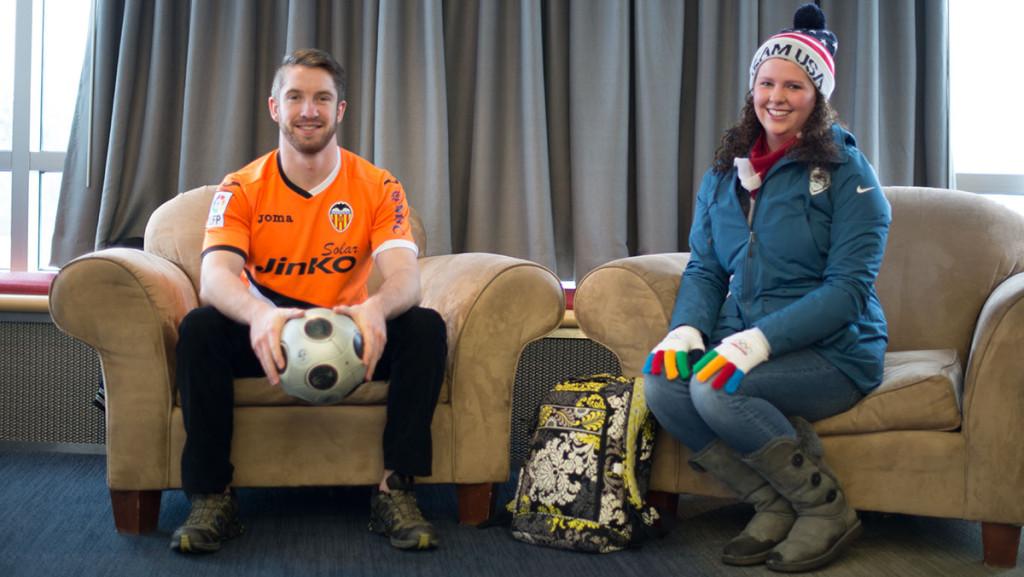In November 2014, senior Courtney Caprara was planning a trip to Paris from her flat in London. At about the same time, junior Matt Byers was feasting on 100 Montaditos — bite-sized Spanish sandwiches — in Valencia, Spain, with the Spaniards who lived in his dorm. Today, however, they’ll go about the day of an average Ithaca College student: balancing classes, work, extracurriculars and social activities. On the surface, they seem like every other student.
But when Caprara chats with her roommate, they reminisce on their Fall 2014 semester together in London. And when Byers falls asleep, he doesn’t dream of soccer practice on South Hill: He dreams of playing a pickup game with locals in the Valencian park he frequented during his semester there.
Byers and Caprara are just two of countless college students across the country who feel a bittersweet nostalgia for their study-abroad days. Once they’ve attended the Olympic Games opening ceremonies, learned Spanish slang from locals at a cafe over freshly brewed espresso or heard the Pope speak at the Vatican, sitting in a classroom undoubtedly leaves them wanting more. This void often pervades students’ lives for months or longer after resuming “real life,” leaving them in a solemn state sometimes referred to as “post-study-abroad depression,” or PSAD. Though not an entry in the Diagnostic and Statistical Manual of Mental Disorders, it’s a casual diagnosis Byers, Caprara, students and study-abroad professionals all recognize.
The most lasting effect, Byers said, is a longing to go back.
“I’ll still wake up from a dream and think I’m in my bed in Spain. I still get really sad not being there,” Byers said.
The stages of transition after returning from abroad begin with initial excitement but can quickly progress into a judgmental period and reverse culture shock, according to the re-entry guide by the Institute for the International Education of Students. IES provides advice for students returning from studying abroad to ease the transition back to daily life in the U.S. For Byers, the readjustment began as soon as he stepped off the plane.
“English was jarring,” he said. “Coming back to the states and hearing my parents speak English — that’s normal. But getting to the airport and hearing English surrounding me, as opposed to Valenciano and Spanish, was kind of like being back in a foreign country again.”
Byers said keeping busy and seeing friends helped at first, but the feeling of sadness just took longer to sink in.
“It wasn’t immediate because I came right back and went to see my friends that I hadn’t seen,” Byers said. “It kind of helped things along, but I was still kind of empty. It was like a slow progression into a depression. I miss [Spain] every day.”
To cope, Byers said he took any language class he could — two Spanish classes and one Italian — and would “hunt out Spanish speakers on campus.” He attends Spanish conversation hours, listens to Spanish music and watches television and movies in Spanish just to immerse himself back in his study-abroad experience.
From 2011–12, only about 1 percent of United States higher education students studied abroad, according to the National Association of Foreign Student Advisors: Association of International Educators. However, Rachel Gould, study-abroad director at the college, said the college has a higher rate.
“About 30 percent of a graduating class will have a study-abroad experience,” Gould said.
Caprara, who studied with close friends in London, said it was comforting to return to Ithaca knowing all her friends from abroad would be there. But in January 2014, following her semester in London, she set off for an internship with NBC in Sochi, Russia, for the 2014 Winter Olympic Games. Following her two adventures abroad, Caprara said it was difficult to convey just how amazing the experiences were.
“It’s really hard to put into words just the happiness that I felt when I was there,” Caprara said. “And I didn’t want to say I was pretending to be happy back at home because it was definitely good to be back, but, at the same time, I definitely still wished that I was having those experiences.”
Gould said part of the difficulty upon returning is that home, though familiar, doesn’t seem the same.
“I think studying abroad opens our eyes to a lot — even studying someplace that’s not so different from our own culture. We see the world from a new perspective, which can be why it’s so difficult to return to average daily life,” Gould said.
Though PSAD won’t last forever, it’s contributed to the sense of insatiable wanderlust that many students, like Caprara, experience. Following her graduation in May, she said, she would love to return to Europe, even though it would mean being far from important people in her life.
“How do you say to all your friends, to all your family, ‘I love you, but I want to go back’?” Caprara said.














